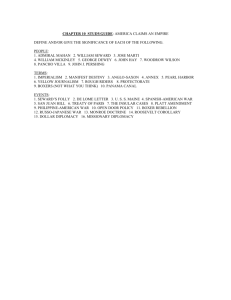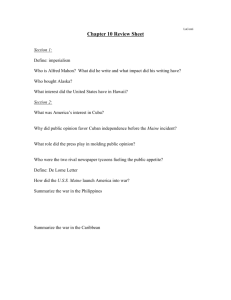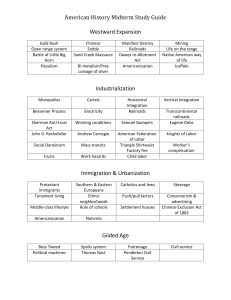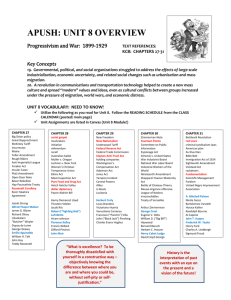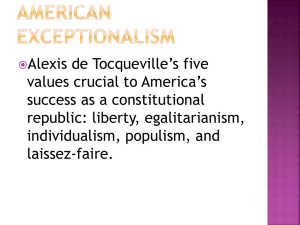Ch 20.2 & Ch 22.1 Reading Guide (Imperialism and Expansion)
advertisement
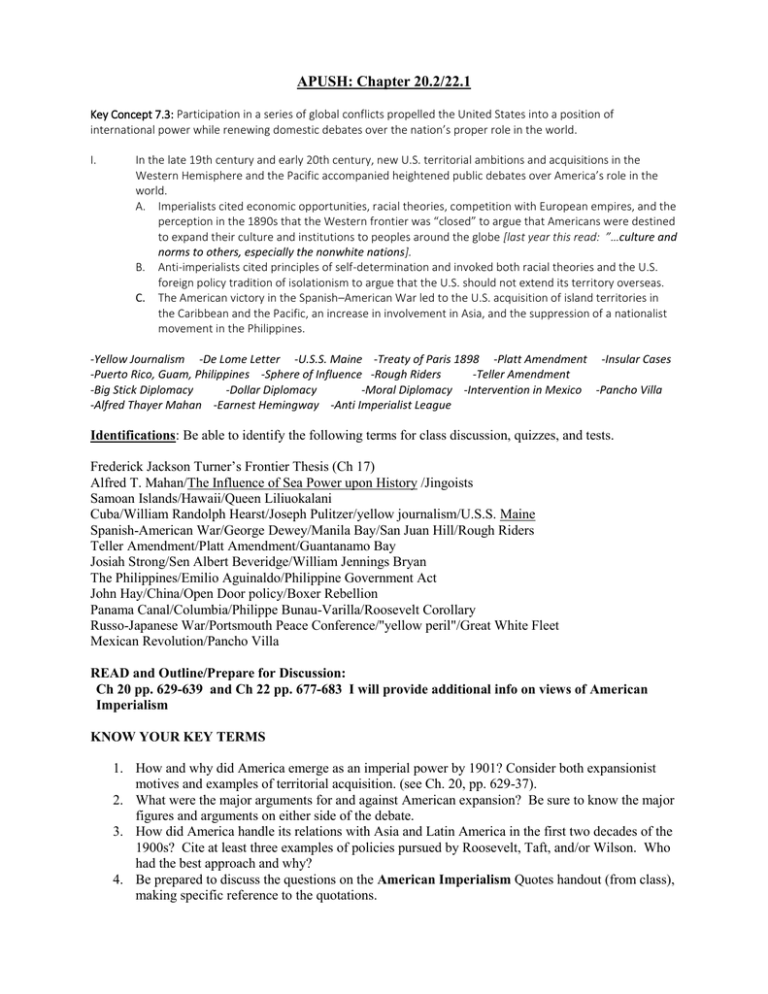
APUSH: Chapter 20.2/22.1 Key Concept 7.3: Participation in a series of global conflicts propelled the United States into a position of international power while renewing domestic debates over the nation’s proper role in the world. I. In the late 19th century and early 20th century, new U.S. territorial ambitions and acquisitions in the Western Hemisphere and the Pacific accompanied heightened public debates over America’s role in the world. A. Imperialists cited economic opportunities, racial theories, competition with European empires, and the perception in the 1890s that the Western frontier was “closed” to argue that Americans were destined to expand their culture and institutions to peoples around the globe [last year this read: ”…culture and norms to others, especially the nonwhite nations]. B. Anti-imperialists cited principles of self-determination and invoked both racial theories and the U.S. foreign policy tradition of isolationism to argue that the U.S. should not extend its territory overseas. C. The American victory in the Spanish–American War led to the U.S. acquisition of island territories in the Caribbean and the Pacific, an increase in involvement in Asia, and the suppression of a nationalist movement in the Philippines. -Yellow Journalism -De Lome Letter -U.S.S. Maine -Treaty of Paris 1898 -Platt Amendment -Insular Cases -Puerto Rico, Guam, Philippines -Sphere of Influence -Rough Riders -Teller Amendment -Big Stick Diplomacy -Dollar Diplomacy -Moral Diplomacy -Intervention in Mexico -Pancho Villa -Alfred Thayer Mahan -Earnest Hemingway -Anti Imperialist League Identifications: Be able to identify the following terms for class discussion, quizzes, and tests. Frederick Jackson Turner’s Frontier Thesis (Ch 17) Alfred T. Mahan/The Influence of Sea Power upon History /Jingoists Samoan Islands/Hawaii/Queen Liliuokalani Cuba/William Randolph Hearst/Joseph Pulitzer/yellow journalism/U.S.S. Maine Spanish-American War/George Dewey/Manila Bay/San Juan Hill/Rough Riders Teller Amendment/Platt Amendment/Guantanamo Bay Josiah Strong/Sen Albert Beveridge/William Jennings Bryan The Philippines/Emilio Aguinaldo/Philippine Government Act John Hay/China/Open Door policy/Boxer Rebellion Panama Canal/Columbia/Philippe Bunau-Varilla/Roosevelt Corollary Russo-Japanese War/Portsmouth Peace Conference/"yellow peril"/Great White Fleet Mexican Revolution/Pancho Villa READ and Outline/Prepare for Discussion: Ch 20 pp. 629-639 and Ch 22 pp. 677-683 I will provide additional info on views of American Imperialism KNOW YOUR KEY TERMS 1. How and why did America emerge as an imperial power by 1901? Consider both expansionist motives and examples of territorial acquisition. (see Ch. 20, pp. 629-37). 2. What were the major arguments for and against American expansion? Be sure to know the major figures and arguments on either side of the debate. 3. How did America handle its relations with Asia and Latin America in the first two decades of the 1900s? Cite at least three examples of policies pursued by Roosevelt, Taft, and/or Wilson. Who had the best approach and why? 4. Be prepared to discuss the questions on the American Imperialism Quotes handout (from class), making specific reference to the quotations.

